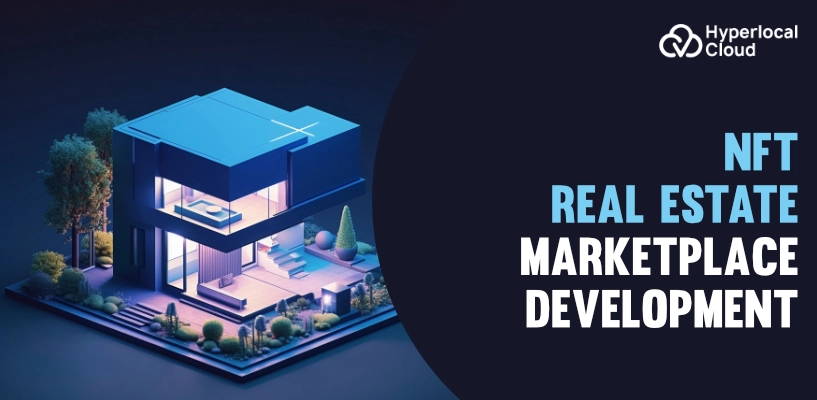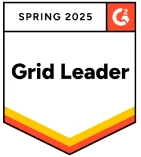NFT Real Estate Marketplace Development

NFTs are at the forefront of real estate transformation. These unique digital assets reshape how buyers and sellers interact, eliminating barriers such as lengthy processes, intermediaries, and high fees. The birth of an NFT real estate marketplace is a testament to this transformation, and understanding its key elements is crucial to staying ahead in this evolving landscape.
Let Hyperlocal Cloud be your development partner, turning your vision into reality and helping you stand out! Contact us today.
However, comprehending the NFT real estate marketplace includes different elements to better understand the subject. Read on to learn how impeccable it is for your property management business!
What is the NFT Real Estate Marketplace?
The NFT real estate marketplace is a contemporary platform that combines the concept of NFTs with property management transactions. NFTs represent ownership of a specific content or item. This marketplace transforms the process of buying, selling, and investing in property.
Why Do NFTs Matter in Real Estate?
NFTs transform the real estate industry by simplifying the transfer of property ownership, making transactions efficient and seamless. They also ensure enhanced security, reducing the risk of digital fraud. This secure environment facilitates swift and secure property transfers between buyers and sellers by leveraging blockchain technology.
What Makes NFT Real Estate Marketplaces Unique?
It stands out due to the following attributes-
Digital Ownership: Every NFT is unique, ensuring the ownership of a property is indisputable and clear. Verifying the ownership of physical properties and virtual real estate in the Metaverse or digital land is helpful.
Blockchain Technology: Blockchain technology ensures the storage of records of every property transaction in an immutable ledger. It diminishes the risk of fraud and makes it easier to trace ownership history.
Fractional Ownership: NFTs stimulate fractional ownership, representing each property divided into multiple shares. It allows investors to buy, sell, or trade their fractional ownership NFTs on the marketplace, enabling them to own a portion of a property.
Smart contracts: They minimize the need for intermediaries and boost the transaction process. They automate payment processing, transfer of ownership, and legal compliance needs.
Global Accessibility: Tapping the NFT real estate marketplace provides an opportunity to reach an international audience, helping them invest in properties overseas. This global accessibility encourages a more inclusive investment environment.
Virtual Real Estate: NFT marketplaces are at the forefront of a transformative trend-virtual real estate. This innovative concept allows people to sell, buy, and invest in digital properties, expanding the traditional notion of property ownership. These properties exist within digital environments like Metaverse, marking a new era in real estate investment.
P2P Interaction: In the NFT real estate marketplace, buyers and sellers can conduct direct transactions without intermediaries. This decentralized model provides customers with more control over transactions and ownership rights.
NFT Listings: In real estate, digital deeds allow fractional ownership and decentralized transactions, promising more convenient transfers, transparency in ownership history, and potential liquidity.
Two-Factor Authentication: NFT real estate marketplaces use two-factor authentication. It compels users to verify their identity via a secondary mechanism, such as a code texted to their phone.
Multiple Payment Gateway Integration: These marketplaces allow buyers to utilize various payment methods, including credit cards, bitcoins, and digital wallets. This flexibility makes transactions more frictionless, meeting buyer preferences and increasing transaction efficiency.
Integrated NFT Wallet: An integrated NFT wallet ensures seamless transactions and secure storage of digital properties. It optimizes the property management experience for buyers and sellers alike.
Auction Process: Customers can participate, bid, and monitor auctions in real-time, ensuring fair value discovery and increasing interaction among possible buyers and investors.
Data Encryption: Robust data encryption algorithms protect sensitive information like property details and transaction records. This preserves all users’ privacy and security while maintaining trust and compliance with digital property ownership rules.
IPFS Storage System: An IPFS storage system assures the decentralization and efficiency of property metadata and digital assets in the NFT real estate marketplace. This technique allows frictionless transactions and safe ownership verification.
Ready to tap the real estate sector with NFTs perks?
Significant Features of NFT Real Estate Marketplace
NFT real estate marketplaces appeal to business owners seeking to tokenize their assets. They make property management flawless and help customers find suitable properties. You must explore the best features of the NFT real estate marketplace to understand it better.
For You
Tokenization of Assets
Property Tokenization: NFTs encourage fractional ownership. This allows you to tokenize and divide your property projects into tradable units, making properties accessible to more investors.
Enhanced Liquidity: You running the real estate business can tokenize the properties, resulting in augmented liquidity. Moreover, it becomes easy for you to trade tokens swiftly.
International Access and Reach
Overseas Transactions: Geographical constraints no longer exist with NFT marketplaces. They streamline global transactions, opening endless opportunities for investors to buy or sell properties worldwide.
24/7 Accessibility: Digital platforms have 24X7 accessibility. It improves visibility and engages more footfall anytime, reducing the time properties remain on the market.
Smart Contracts and Automation
Automated Transactions: Automation is the power of the tech-driven world. Efficient transactions occur with smart contracts that automate payment verification, rental income distribution, etc.
Lower Costs: Automation can reduce transaction costs by eradicating paperwork and intermediaries. It makes the process fast, reliable, and credible for investors.
Market Exposure and Transparency
High Visibility: NFT marketplaces allow you to list your properties. This boosts exposure to your targeted audience interested in digital assets and blockchain technology.
Transparency: Blockchain technology ensures transparent transaction histories and ownership records. A transparent marketplace provides confidence to investors or buyers.
Monetization of Digital Assets
Royalties and Resale Rights: You can earn royalties on subsequent trades of your property tokens. In addition, you can retain resale rights that benefit potential appreciation in property value.
For Your Customers
Access to Global Real Estate
Fractional Shares: Customers purchase fractional shares of high-value properties. This enhances the possibilities of diversifying their investment portfolios, which might otherwise be financially out of reach.
Diverse Investment Opportunities: NFT marketplaces provide access to different global properties, such as commercial and residential properties.
Transparency and Security
Immutable Records: Blockchain technology ensures ownership records are tamper-proof and secure. It provides transparency and annihilates disputes over property ownership.
Authentication of Assets: NFTs undergo verifying the authenticity of digital assets. They ensure customers buy legitimate property tokens.
Liquidity and Flexibility
Trading Opportunities: Secondary markets, like resale properties, existing homes, and established residential areas, allow people to trade NFTs. This offers them liquidity compared to traditional real estate investments.
Ease of Transaction: Digital platforms allow more efficient transactions, reducing the complexity and time needed to sell or buy real estate.
Innovative Ownership Models
Shared Ownership: Customers co-own properties with other investors, diversifying risk and potentially increasing returns.
Global Portfolio Diversification: Customers can establish an internationally diversified real estate portfolio without investing much money.
Community and Engagement
Community Interaction: NFT marketplaces frequently generate communities of like-minded investors and enthusiasts, which facilitates information sharing and networking opportunities.
Educational Resources: Platforms may provide tools and educational content on blockchain technology, NFTs, and real estate investing strategies to delegate customers.
Working Criteria of the NFT Real Estate Marketplace
The NFT real estate marketplace focuses on trading virtual lands, buildings, and properties. Read on-
Sign-in/Registration
Users connect their wallets, sign up on the platform, and enter the virtual land to buy or sell collectibles or land.
Listing NFT
Registered users can list their lands on the platform by converting them into NFTs and updating the relevant details.
Auction
An auction is conducted for the listed land, and users can bid for ownership. The highest bidder wins the auction and purchases the land.
Transferring Ownership
The seller (current property owner) transfers ownership to the buyer (auction winner) through legally binding smart contracts.
NFT Real Estate Marketplace Development Steps
Building an NFT real estate marketplace includes various steps and considerations. Below are detailed steps-
Market Research
Developers at Hyperlocal Cloud conduct market research to understand the NFT concept in the real sector, recognize target audiences and set clear goals for marketplace development. It helps them determine whether the platform emphasizes residential, commercial, or both real estate types. Moreover, they define the functionalities required, including trading, NFT minting, fractional ownership management, and integration with blockchain wallets.
Technical Architecture
To initiate this step, choose a suitable blockchain platform for creating and deploying NFTs. Ethereum is the most popular choice due to its chronic NFT standards. Our developers build smart contracts that oversee ownership, NFT creation, and transfer. Further, they integrate the marketplace with blockchain wallets and design an intuitive and user-friendly interface.
Development Process
The experts implement the designed UI/UX into front-end development using frameworks like React.js or Angular.js. They build the backend infrastructure to monitor user authentication, data storage, NFT metadata management, transaction processing, and integration with blockchain nodes. They also rigorously evaluate the entire platform for functionality, performance, security, and compatibility.
Legal and Regulatory Compliance
It is best to seek legal advice before running the app. Our development team ensures local laws and regulations govern all real estate transactions, digital assets, securities, and data privacy. They provide thorough terms of service and a privacy policy that defines user rights, duties, platform usage rules, data processing methods, and dispute resolution mechanisms.
Launch and Marketing
Our development focuses on deploying the marketplace in a soft launch phase to a limited audience or conducting beta testing with selected users. Before the launch, they collect feedback, recognize enhancements, and resolve faults. After that, they create a marketing strategy to promote the marketplace and attract users. Also, they engage with users, provide support, gather feedback, and encourage participation in NFT auctions, trading, and discussions.
Maintenance and Updates
The experts at Hyperlocal Cloud monitor the marketplace for performance metrics, user activity, transaction volumes, and security incidents. They iterate and improve the marketplace in response to customer feedback, technical improvements, and market trends. They also strengthen platform security by conducting frequent audits, vulnerability assessments, and updates to reduce potential risks, including hacking, fraud, and data breaches.
Supercharge Your Real Estate Business with NFT Marketplace!
How is NFT Real Estate Marketplace Development Beneficial?
Virtual real estate is gaining immense popularity because a real estate NFT marketplace offers several benefits. Here are the key perks:
Fast Transactions: Transactions occur online, cutting out paperwork. This allows property ownership to transfer quickly between parties.
Fractional Investment: The marketplace allows people to invest in real estate even with little funds. It provides fractional investment,
Transparency: Blockchain technology, such as BSCScan and Ethereum, makes transactions transparent, lowering the likelihood of fraud in real estate transactions.
Collateral: Real estate NFTs are helpful as collateral for loans. Platforms such as Nexo and NFTfi offer loans backed by NFTs, providing liquidity options.
No Middleman: Decentralized transactions diminish the need for intermediaries, streamlining buying and selling virtual real estate in the NFT marketplace.
Development Cost of NFT Real Estate Marketplace
The development cost of the NFT real estate marketplace varies with features and complexities. It may range between US $10,000 to $500,000 and exceed, depending on your requirements. The experts at Hyperlocal Cloud cover essential functionalities such as NFT creation, user registration, and basic auction mechanisms under the development process. Advanced platforms with additional features like enhanced user interfaces, advanced auction mechanisms, integration with multiple blockchains, and robust security protocols can exceed the estimated price. As costs rely on backend infrastructure, design complexity, ongoing maintenance requirements, and regulatory compliance considerations, it is imperative to consult professionals to know the cost estimation.
Are you considering developing an NFT Real Estate Marketplace but need help setting it up on a shoestring budget? Let’s connect and find the best solution to help you enter the real estate market!
Why Choose Hyperlocal Cloud For NFT Real Estate Marketplace?
Hyperlocal Cloud has been leading the IT industry for more than a decade. Our experts offer solutions that help businesses enhance their customer base, growth, and revenue.
We’ve covered it for you; below are the top reasons to avail of our services.
- Timely Delivery
- Cost-effective platform development
- Quality Assurance
- Quick Launch
- Smooth Communication
- 24/7 Customer Assistance





